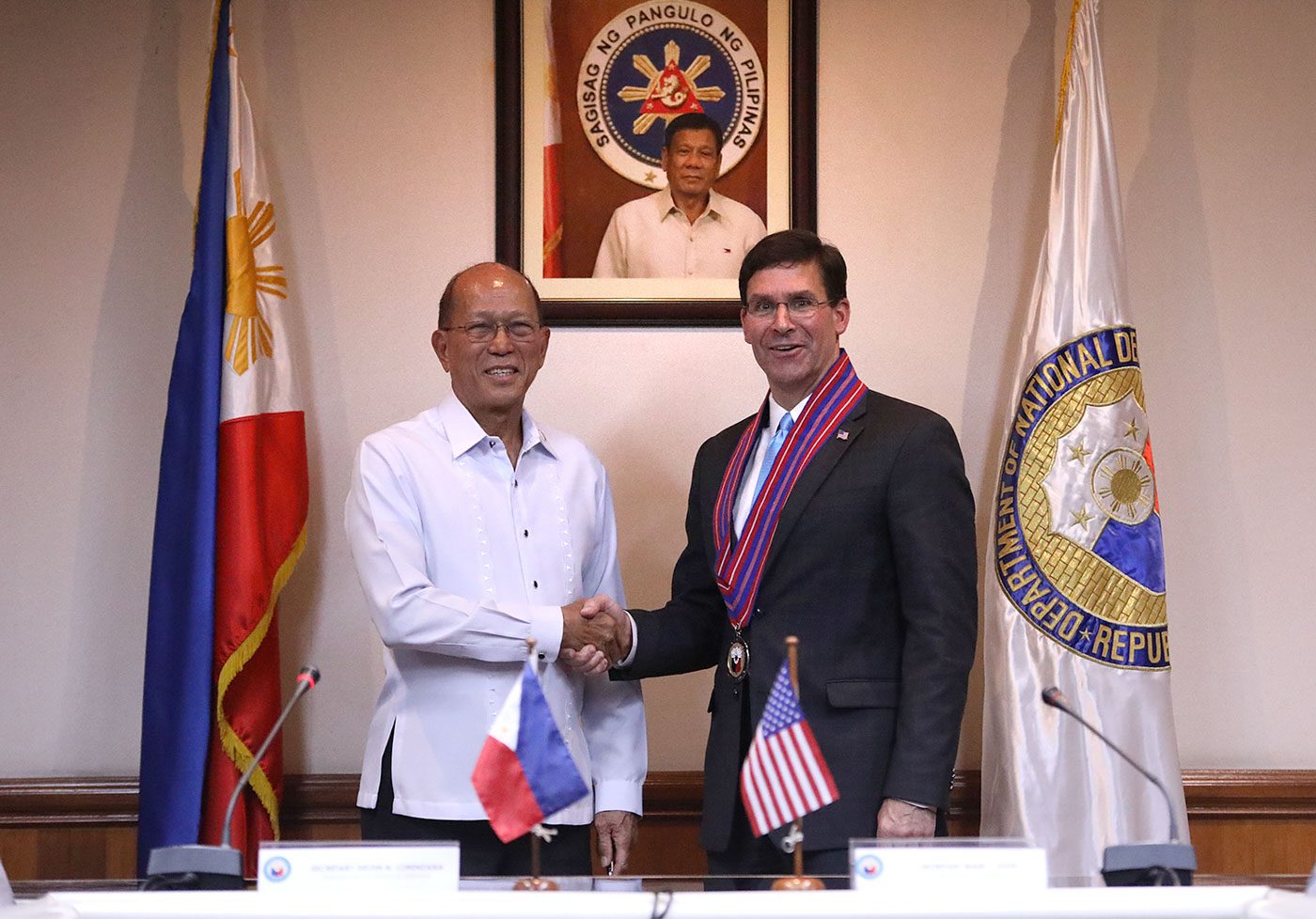SUMMARY
This is AI generated summarization, which may have errors. For context, always refer to the full article.

MANILA, Philippines – United States Defense Secretary Mark Esper agreed with his Philippine counterpart that the nearly 70-year-old defense treaty between the two countries should be reviewed to make sure it fits with current geopolitical realities, including China’s rise as a global power.
“I think as a rule of thumb, it’s always good to look at these things from time to time to review and to clarify and strengthen it based on changes in the environment and the world situation,” Esper said in a joint media briefing with Defense Secretary Delfin Lorenzana on Tuesday, November 19, at the Department of National Defense main office in Camp Aguinaldo, Quezon City.
Esper visited Manila on Tuesday as part of an Indo-Pacific tour that also included South Korea, Thailand, and Vietnam. In Manila, Esper and Lorenzana discussed the full range of issues affecting bilateral defense relations hinged on the treaty alliance.
Concerns about what Esper described as China’s “use of coercion or intimidation to advance its national interests” figured heavily in the briefing with both Philippines-based and foreign reporters.
The Philippines has had to bear with Chinese encroachments of its exclusive economic zone (EEZ) and territorial waters in the West Philippine Sea. Chinese coast guard and naval vessels have been spotted traversing or even patrolling areas in which the Philippines has been legally declared by an international arbitral tribunal to have sovereign rights.
Moreover, Chinese vessels have harassed Filipino fishermen in their own traditional fishing grounds, as in the case of the fishing boat Gem-Ver and its 22 crewmen last June.
Early on, Esper reaffirmed that the 1951 Mutual Defense Treaty between the Philippines and the US “applies to the entire Pacific region, including the South China Sea,” that is, an armed attack on Filipinos in the area would trigger a US defense response.
Esper was echoing US Secretary of State Mike Pompeo, who, during a visit to Manila last March, addressed the question of the treaty’s relevance to the Philippines’ dilemma in the West Philippine Sea, or the part of the South China Sea that falls within its EEZ.
Before Pompeo’s statement, Philippine security officials considered the treaty as vague in terms of the US’ obligations to the Philippines when it came to the South China Sea. This was what prompted Lorenzana in December 2018 to call for a review of the treaty – to gauge whether it remained relevant to Filipinos.
On Tuesday, reporters asked Lorenzana and Esper whether they thought a review of the treaty was still necessary after the US clarified its application to the South China Sea.
Lorenzana noted that the treaty was forged at the height of the Korean War. “The situation then compared to now is different,” he pointed out, adding that he thinks a review of the treaty is still in order.
Esper, for his part, said that the US’ new national defense strategy, which it adopted in 2018, factors in the security challenge posed by China, and the treaty with the Philippines should be updated to reflect this view.
“We are now in an era of great power competition and it requires us to look at the world differently, and to build different capabilities and reposition ourselves, and to emphasize the importance of this theater, the Indo-Pacific theater,” Esper said.
Lorenzana said his proposal to review the treaty would be taken up in the next Philippines-US Mutual Defense Board meeting “sometime this year.”
Esper, citing the shifting geopolitical climate in the region, said, “I think for all those reasons, it’s good to do so.” – Rappler.com
Add a comment
How does this make you feel?
There are no comments yet. Add your comment to start the conversation.